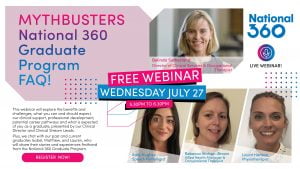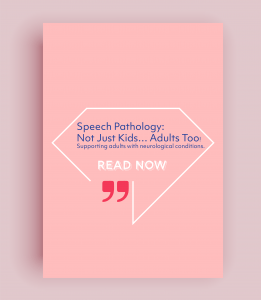Top 10 Questions to Ask When Seeking an Allied Health Graduate Program
Looking for a graduate job can be overwhelming. You may be bombarded with several recruiters on LinkedIn boasting about why their program is the best. But how do you decide which program is right for you?
We have developed a list of important questions to ask employers when seeking an allied health graduate program to help you make the right choice.
- How the organisation aligns with your values
Finding a job that conforms to your values can help you excel without compromising your personal beliefs. However, finding a job that fits your values requires some foresight. Developing clarity around career objectives, values, motivators and strengths can help you identify the type of employment you will be seeking. Understanding this not only helps you find a workplace that fits with your values, but it will also help with the interview process when articulating why you are the right fit for the job.
- Workplace culture
Arguably the most important element in choosing a graduate program is the culture. Workplace culture can be influenced by several factors, including policies, leadership structures, and the people. Seeking a workplace that recognises your performance, celebrates your achievements, and values team bonding and social events should be highly considered on your job search. Seeking shadow opportunities or an office tour is a great way to see if the culture is right for you.
- Supervision structure
Supervision is an important element of any allied health role. It can improve your clinical practice, provide opportunities for new learnings and skill development, and ensures therapists receive support. It is important to consider what kind of formal and informal support networks exist within an organisation to best support your journey as a new graduate. To ensure you are receiving appropriate support, look for an organisation that provides regular individual and group supervision opportunities.
- Mentoring with Clinical Practice Advisors
Alongside clinical supervision, regular mentoring sessions can further assist your learning and development as a new graduate. Mentoring, often run by Clinical Practice Advisors, provides guidance in one or more areas of allied health to ensure therapists receive high-quality, specialised advice to assist in the management of a diverse caseload. Clinical Practice Advisors often come with several years of experience helping new graduates broaden their skills.
- Multidisciplinary model
Working in a multidisciplinary team provides clients with holistic, individualised, and collaborative care from a range of disciplines. Not only does a multidisciplinary model improve client outcomes, but there are also several employee benefits. These can include increased work satisfaction, a sense of community, improved service coordination, and increased understanding for each team member’s role.
- Key Performance Indicators (KPIs)
What are KPIs?
Key performance indicators are measures that are used to evaluate the success of an individual in their role. All organisations will have a set of KPIs for each position within the company. It is important to understand the measures of success an organisation will use during your graduate program and beyond. These may include clinical quality, time management and organisation, billable activity, self-directed learning, professional standards and behaviours, and engagement with supervision.
One KPI that is often focused on is billable activity and while it is important for organisations, it is not the only KPI that is measured. All organisations will have a billable activity expectation for their therapists. These will vary between organisations and often between roles within an organisation. Understanding the graduate program’s billable activity expectation is one thing, but understanding which activities are classified as billable hours (for example travel) can help you decide whether your KPIs are attainable. A graduate program with achievable and gradually increasing billable activity expectations is essential to allow time for learning and development.
- Wellbeing services or program
An organisation that hosts established wellbeing services receives a big tick of approval. Having these services in place supports your mental, physical, and emotional health during the challenging transition from student to a full-time employee.
- Working arrangements
A workplace that offers flexible working arrangements provides a great work-life balance for new graduate therapists. Flexibility can include the choice to work from a home or office location or having the ability to adjust your working hours to suit your lifestyle.
- Opportunities for continuing professional development
Continuing professional development is how allied health clinicians maintain, improve, and broaden their knowledge, expertise, and competence. In fact, it is a mandatory requirement to ensure your knowledge and skills remain up to date. A workplace that supports both internal and external professional development opportunities ensures you remain a lifelong learner for the continued provision of safe and effective services.
- Remuneration
Although taboo, as you don’t want a company to assume money, is your main motivator, there is no denying its importance in your job search. It can quite often be brought up before you ask, however, if it’s not and you have any concerns about wasting your or the employer’s time, don’t hesitate to ask before it gets too late. Asking about remuneration can help you break down the components of the salary package, including travel allowance, professional development, and KPI bonuses, to help you make an informed decision.
The National 360 Graduate Program has been specifically designed for Graduates and Early Career Therapists who want to work within the NDIS, aged care and insurance sectors within a community setting. While the Program is designed to increase your generalist skills, our unique allocations process and supervision structure enable us to tailor caseloads and education in consideration of your preferences and areas of interest.
We are committed to quality, learning focussed 12-month Allied Health Graduate Program to support your needs as a new clinician. We understand that moving into your first role can be exciting, but also daunting and challenging, so we are committed to supporting you through our 360 circle of support. This includes individual, group and team support for all our graduates.
Find out more about our 360 Graduates program here: https://national360.com.au/careers/360-graduates/
Register to attend our upcoming FREE webinar on Wednesday, July 27 at 5.30 pm: MythBusters – National 360 Graduate Program Webinar and FAQ!
Learn more and register to attend here: https://bit.ly/3OXePQT




